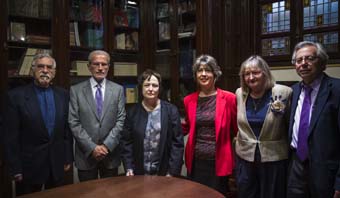
Philosopher Celia Amorós has criticised this Friday ‘those solomonlings [a reference to the biblical king Solomon] who control institutions of the patriarchal society and rule issues that affect women’. Amorós has received her Universitat de València’s medal in a solemn ceremony celebrated in the Paranymph of the historic building La Nau.
Philosopher Celia Amorós has criticised this Friday ‘those solomonlings [a reference to the biblical king Solomon] who control institutions of the patriarchal society and rule issues that affect women’. Amorós has received her Universitat de València’s medal in a solemn ceremony celebrated in the Paranymph of the historic building La Nau.
Apart from the honoured, the principal Estaban Morcillo will give a speech together with the full university professor of Psychology, Esther Barberá, who will pronounce the ‘laudatio’. Some of the people attending this act are Alberto Ibáñez, autonomic secretary of Inclusion; Josefina Bueno, general director of Universities; Salvador Palazón, general director of AVAP; members of the university community and representatives of feminist movements.
On her intervention, Amorós has talked about common men appeal as to the authority argument in their opinions about relationships between women and men, as well as to testimonies and wises’ decrees ‘without realising the fact that the base of these sapience decrees is the same common sense that masses share, the one established by men themselves’. ‘This way, a game of mirrors is recreated at the same time as an epistemological crash effect’, she stated.
She added that ‘Solomon left his legacy: solomonlings; who do not have his talent but control institutions of the patriarchal society ruling issues that affect women while they name themselves, quoting François Poullain de la Barre, judges working on issues in which they already take part as patriarchs’.
Her words can be read by clicking here.
During the ‘laudatio’, Esther Barberá has reminded how Celia Amorós has spent her life building ‘an own thinking based on reflection and academic, political action’. ‘Her core idea consisting of ‘to conceptualize is to politicise and to politicise implies to conceptualize’ has been supported by her during all those years: she was a militant in the Women’s Liberation Front of Madrid until 1980 and in 1987 she founded the Feminism and Illustration Seminar in the UCM which, from its beginning, it has collaborated closely with the Interdisciplinary Seminar of Feminist Research, created that same year’, she stated.
The full ‘laudatio’ can be read by clicking here.
Finally, the Principal Esteban Morcillo has defined Celia Amorós as ‘a relevant figure in the feminist contemporary thinking, a real university woman because of her teaching task, researcher and of disclosure that has helped her becoming a renowned essayist that has stood up for equality in order to build a better society’.
The principal has also said that ‘We need to avoid to take a step back when it comes to equality, because we still have a long way to go. We need to add the dramatic numbers of gender violence and abuse to this reality, especially now that we are living a time of communication technologies’ omnipresence’.
The Principal’s speech can be checked out by clicking here.
Celia Amorós (València, 1944) has published several essays about feminism. Until her retirement, she was the full university professor of Philosophy in the National University of Distance Education (UNED). She holds a degree and a doctorate in Philosophy by the Universitat de València and worked as a high school teacher and a university professor at the Universitat de València and Complutense University of Madrid. She was a visiting professor in Harvard University.
She founded the Feminism and Illustration Seminar that was consolidated in the creation of the Feminist Research Institute of the Complutense University of Madrid. She was the first director of this institute.
Celia is a key referent in the so called equality feminism, studies that she included in the Spanish philosophy. She is also a specialist in the ethical political thinking of Jean Paul Sartre. The majority of her research is focused on the building of relationships between illustration and feminism.
Writer of many books of distinguished impact in the feminist philosophy, like ‘Hacia una crítica de la razón patriarcal’. She has won many awards, among them, the Essay Award María Espinosa, the National Essay Award and the Clara Campoamor of the City Hall of Madrid.
Last update: 10 de march de 2017 14:15.
News release


















